Before we check the alternatives, let’s get to know Bigcommerce better.
BigCommerce
Sticking to the mission of helping merchants sell more at every growth stage, from small start-ups to large enterprises, BigCommerce is now serving in 150+ countries with more than 60,000 merchants and counting.
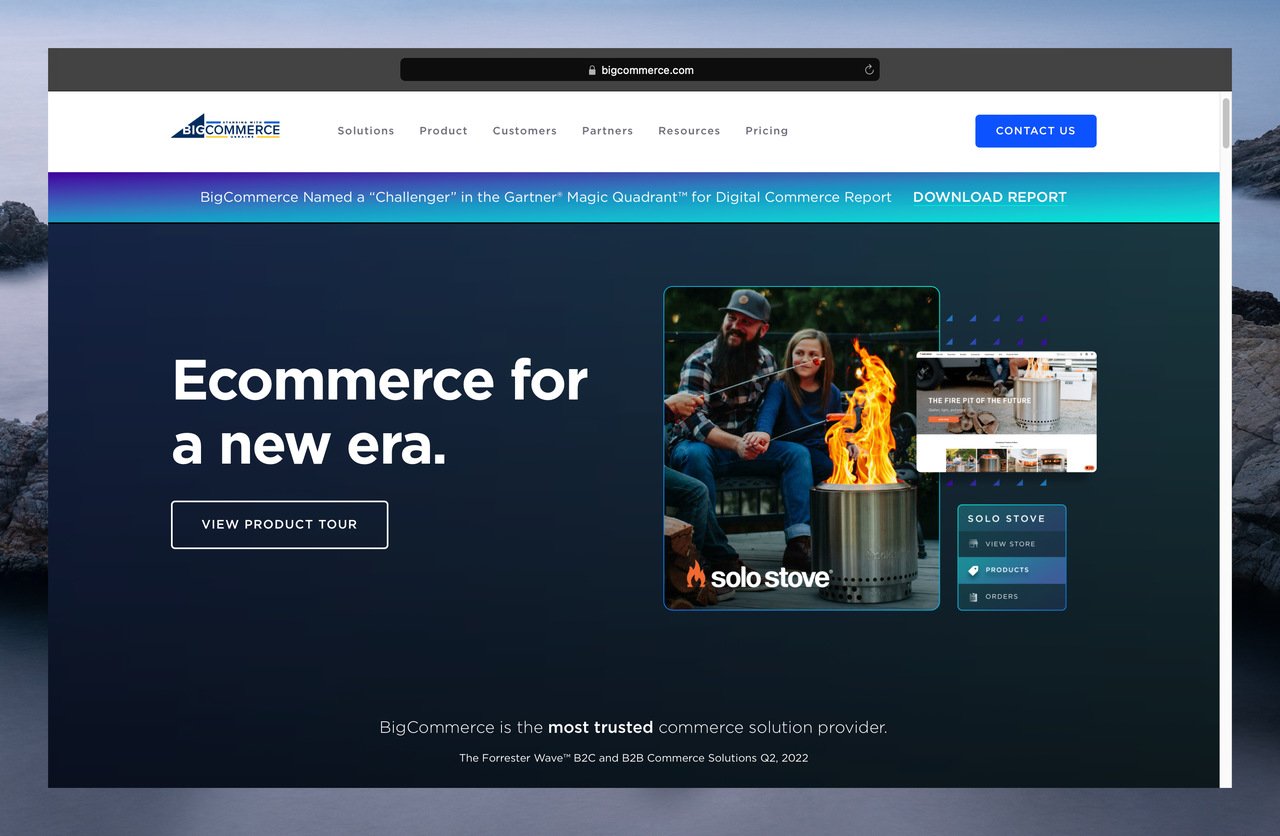
When you have such a mission to fulfill, it’s essential to keep an eye on your fellow e-commerce platforms to protect your place in the business.
BigCommerce offers fantastic features, like:
- Zero transaction fees. (if you use the leading payment gateways)
- Omni-channel selling technology.
- Drag and drop feature for the customization.
- Mobile optimization for all themes.
Furthermore, BigCommerce collaborates with Google to guarantee that industry-standard SEO is included in all of your sites.
You also have complete control over website URLs, title tags, header tags, and information, allowing you to keep your brand in the spotlight.
So, why do you need a BigCommerce alternative, then?
The main reasons are:
- The steep learning curve for advanced features.
- A limited number of free themes
- Customer support needs to be improved.
- Out-of-the box features may not be enough.
Price: BigCommerce's Standard Plan starts at $29.95/mo.
- Ease of Use: 8.8
- Quality of Support: 8.4
- Ease of Setup: 8.8
Now, let’s go through some BigCommerce alternatives to have a kick start in the e-commerce business or switch your e-commerce platform for the better!
Top BigCommerce Alternatives
It's time to see top competitors of BigCommerce with their pros, cons, and prices.
1. Wix
Wix is a free and robust BigCommerce alternative that offers more than 900 designer-made templates that you can use to create aesthetically pleasing websites.
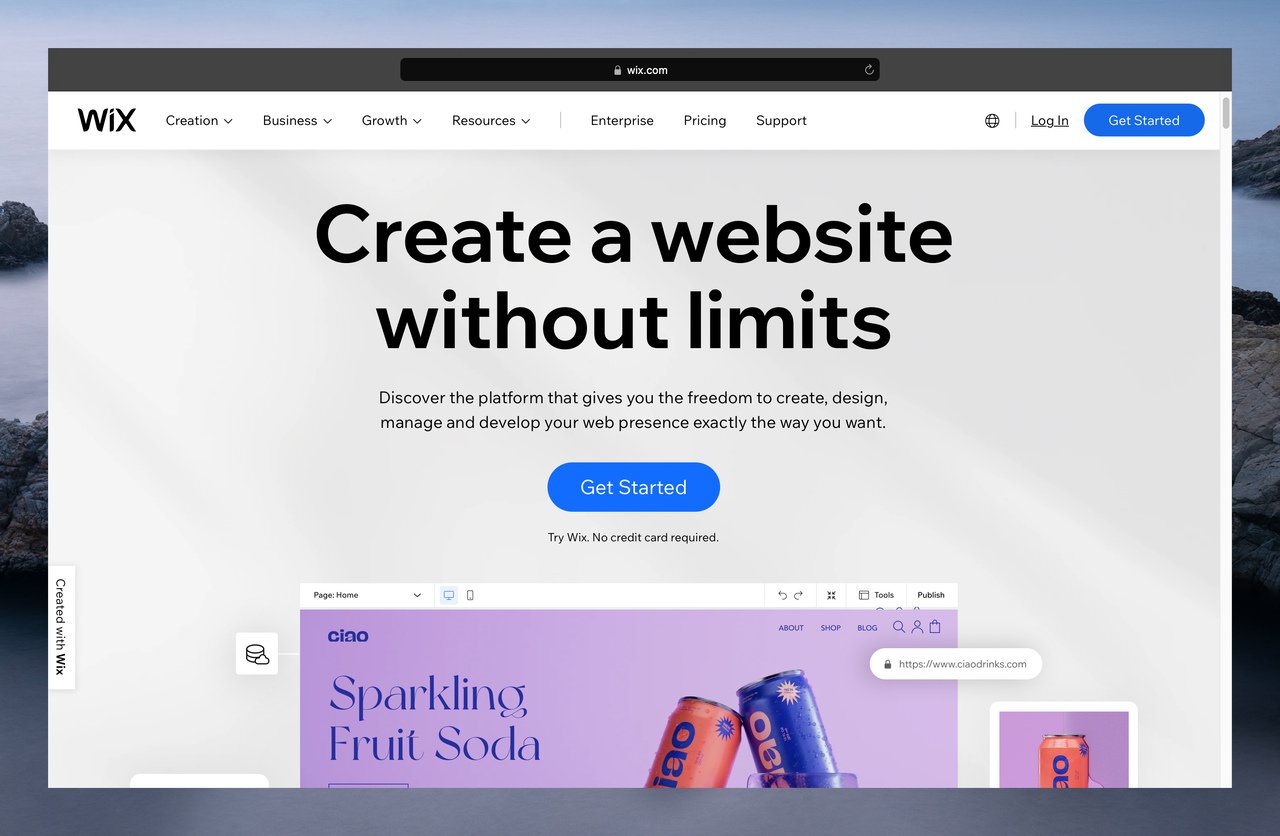
Pros:
- Wix has 900+ of well-designed free templates, so you can easily find a theme for your taste. Visually, it’s a fantastic BigCommerce alternative.
- Wix has quite a big community with over three thousand posts and 12.000 members.
- Your website will look fantastic on any device by default.
- You can edit all of your website photos directly from the Wix editor. Its built-in image editor has easy to use yet robust drag-and-drop editor ideal for both beginners and advanced users.
- Wix SEO Wizard generates suggestions for you to ensure that your website is fully optimized.
- Wix offers you simple integration of three tracking tools: Google Analytics, GoSquared, and Web-Stat, to enhance your site’s performance.
- Wix’s integration with Google Business Profile enables you to manage your Business Profile directly from your Wix dashboard.
- The platform offers a dedicated 24/7 support via phone, email and chat.
- You can translate your store into 180+ languages with Wix Multilingual.
Cons:
- If you don’t use Wix Payments, you’ll be charged 2.9% + $0.30 transaction fee.
- Device responsiveness needs enhancements.
- Limited features with free plan.
Price: Wix provides a 14-day money-back guarantee trial.
Its basic plan costs $27, which is somewhat less than BigCommerce. Furthermore, there is no transaction cost if you use Wix payments, which ! is an important factor to consider.
- Ease of Use: 8.9
- Quality of Support: 7.9
- Ease of Setup: 8.9
2. Shopify
Shopify is a full-service commerce platform that allows you to launch, develop, and manage a business. It powers millions of businesses worldwide and goes head-to-head with BigCommerce in terms of price.

Pros:
- Its app market has 7000 apps and counting.
- Shopify has a much bigger community than BigCommerce, with more than a million posts and 900,000 merchants and partners.
- User reviews show that Shopify is easier to use, making it a good alternative to BigCommerce.
- Your Shopify online store features a mobile commerce shopping cart. Customers may shop and purchase from your store using any type of mobile phone device.
- Shopify doesn’t charge you based on the number of customers that visit your store.
- You can create new orders and enter payment details from your Shopify admin.
- Ability to keep track of your business performance using acquisition, inventory, and behavior reports and so on.
Cons:
- Shopify has transaction fees based on your plan.
- It charges subscription fees.
- Has few built-in features which make your site rely on third-party apps, causing additional costs.
- SEO ability is limited.
Price: Shopify offers a 14-day trial with a Basic Plan starting at $29, similar to BigCommerce, but boomer alert its transaction fees start at 0.5%.
- Ease of Use: 8.8
- Quality of Support: 8.4
- Ease of Setup: 8.8
Also See:
3. WooCommerce
WooCommerce is an open-source WordPress e-commerce plugin.
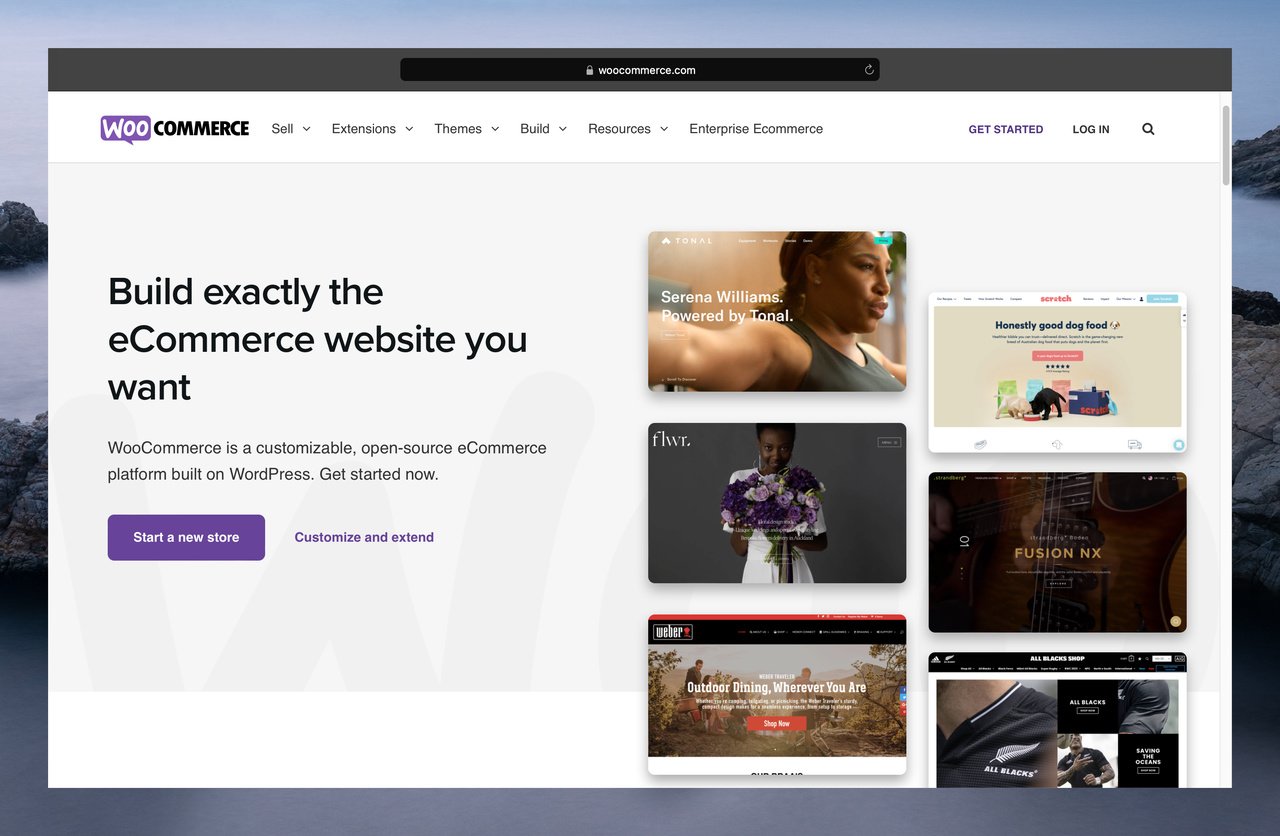
Pros:
- Woocommerce has 48 themes, with only 3 free. The good thing is its paid themes start at $39, making them cheaper than BigCommerce’s theme options.
- If you want to customize your themes, as it is an open-source platform, WooCommerce is a stronger BigCommerce competitor.
- You can show products available on other sites with an affiliate link.
- Automatically detect your customer's address and calculate shipping and tax easily.
- Monitor stock levels and receive alerts for low and out-of-stock items as well as hide out-of-stock items.
Cons:
- WooCommerce doesn’t have a central support system, unlike BigCommerce.
- You basically create your own security using plugins. However, since it’s open-source, you have to be really careful as a small mistake like using unsafe apps can make your site open to attacks.
- WooCommerce is based on WordPress, which has so many users around the world, and the number of users causes the site to perform slower.
Price: If you are looking for a free alternative to BigCommerce, WooCommerce might be the one for you.
Still, you’ll have hosting and maintenance costs, so it’s up to you to decide whether WooCommerce is a better choice compared to BigCommerce in terms of pricing.
Furthermore, WooCommerce doesn’t charge any transaction fees, similar to BigCommerce.
- Ease of Use: 8.5
- Quality of Support: 7.5
- Ease of Setup: 8.3
4. Ecwid
Ecwid (E-commerce WIDget) is a web-based e-commerce platform. It allows company owners all around the world to construct stunning online stores without the help of programmers and designers.

Pros:
- Ecwid provides you with SEO-friendly URLs right out of the box. It handles the technical aspects for you - all stores are automatically optimized for search engines. Plus, you may still manually adjust things like URL structure and meta tags.
- You can create new sales channels by connecting your business to major channels like Google Shopping, Facebook, Instagram, WhatsApp, Amazon, eBay, and others right from your Ecwid Control Panel.
- Thanks to Ecwid ShopApp, you can convert your business into a downloadable mobile app so that consumers can shop from anywhere at any time.
- Ability to connect a point-of-ale system to accept payments from anywhere.
- Automated taxes on transactions.
- Possible to create your own mobile app.
Cons:
- Ecwid has fewer themes and fewer design possibilities.
- It has a smaller app market.
- Live chat and phone support are reserved for premium customers.
- Considering the customer reviews, we can say that Ecwid takes longer to load.
Price: Ecwid’s beginning plan is less expensive than BigCommerce’s basic plan. It costs $15 a month and offers a free plan with up to 10 products and two product categories.
The best thing is that you can retain your free plan indefinitely. Furthermore, as in BigCommerce, Ecwid does not charge transaction fees.
- Ease of Use: 9.4
- Quality of Support: 9.5
- Ease of Setup: 9.3
5. Webflow
Webflow offers software as a service for website development and hosting. You may utilize the online visual editing platform to create, construct, and launch websites.
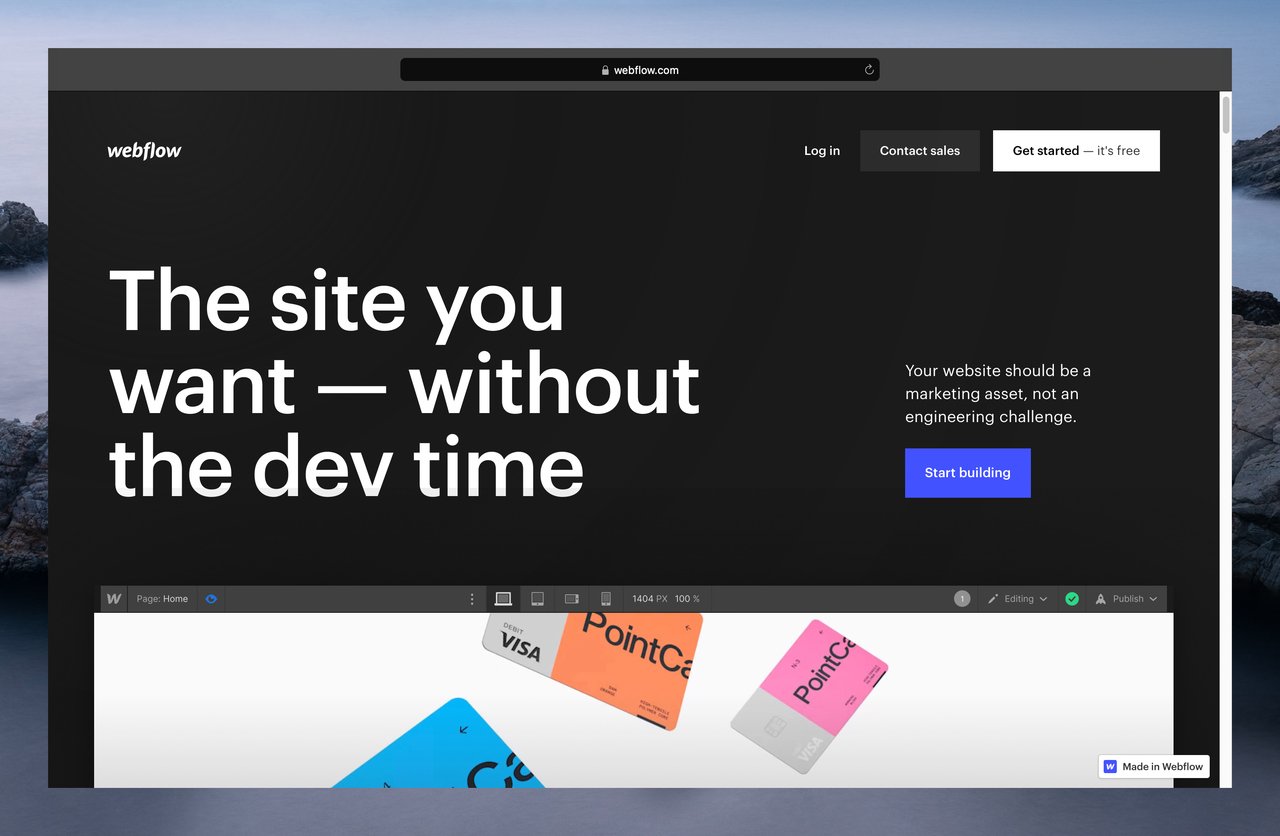
Pros:
- Webflow offers over 1,000 templates that can be customized using its code-free design tools. It’s far ahead of BigCommerce in terms of themes and customization, with over 40 free templates.
- Webflow’s community game is also strong, with one-of-a-kind Webflow University and 75,000 members so far.
- It translates the design choices into clean, standards-compliant code.
- Ability to export your CMS collections as CSVs to move content between sites or platforms.
- You can clone the latest website designs.
- Create a custom 404 page.
- Webflow automatically creates backups of your website.
Cons:
- Webflow does not have an app market.
- Getting a rapid answer is difficult due to limited support.
- Content is difficult to make responsive and changes may not be saved from time to time.
- Features might be overwhelming if you are not an expert.
- Limit on number of collections per page might be frustrating.
Price: Webflow offers a free trial, and its basic plan is $15 per month. On the standard plan, Webflow charges an additional 2% transaction fee. However, there is no transaction fee on higher plans with Webflow.
- Ease of Use: 8.2
- Quality of Support: 8.6
- Ease of Setup: 8.7
Also See:
6. Volusion
Volusion is an e-commerce software solution that offers small and large enterprises an all-in-one e-commerce platform that can accommodate almost any online store.

Pros:
- Customize page layouts using drag and drop content blocks for social networking, image galleries, videos, testimonials, and more to make each page unique.
- Include several photographs, videos, and extensive textual descriptions to showcase your items in the clearest way.
- Themes are mobile friendly.
- Search functionality helps to find the items.
- Homepage slideshow helps you highlight discounts and products.
- Customizable firewall settings are available.
- You can set a different price for each variant of the products.
Cons:
- Volusion presents 24/7 technical support, but if you want advanced assistance, you’ll need to upgrade to a higher plane, which is not the case with BigCommerce.
- Volusion has 45 themes, 11 free and others starting at $180. If you need further assistance with optimization, they provide implementation experts, which is rather expensive. Compared to BigCommerce, it has fewer options but is more expensive.
- Customization is limited.
- May not be as intuitive.
Price: Volusion and BigCommerce go head-to-head in terms of pricing. Both provide a free trial, and Volusion starts at $29 per month, but (and it’s a big but) Volusion’s transaction fee is 1.25%.
- Ease of Use: 7.0
- Quality of Support: 7.2
- Ease of Setup: 6.6
7. PrestaShop
PrestaShop is an open-source e-commerce solution with nearly 300,000 sites using it mainly in Europe and Latin America.
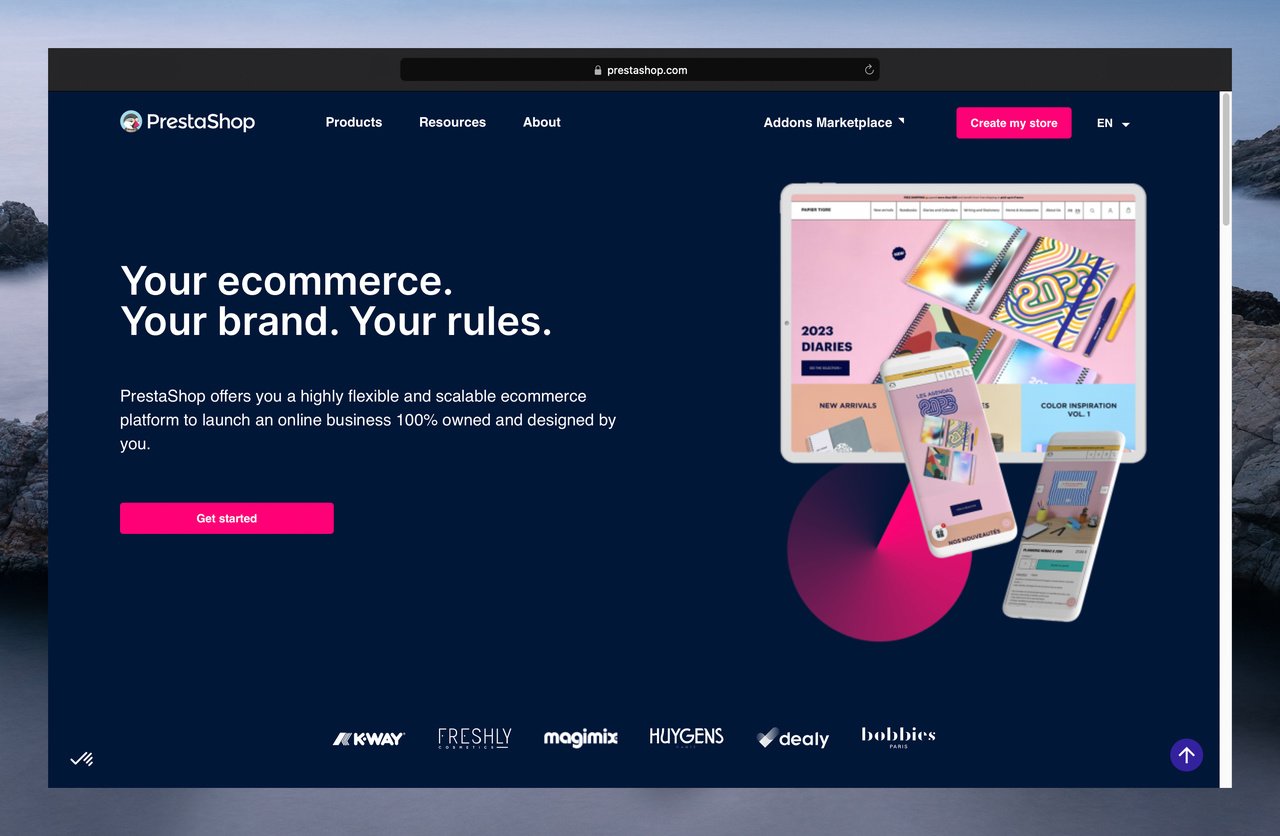
Pros:
- You can create digital products.
- Possible to create categories and subcategories.
- Keep track of each product's inventory and select the message that will appear for out-of-stock items.
- Provide payment options and set the shipping options.
- Map out your physical store locations on Google.
- Set up a one-page checkout and show a summary page before the customer confirms their shopping cart.
- Take digital goods out of the list of returnable items.
- Set up taxes based on the locations.
- Make price rules.
- Make special offers based on a variety of factors, such as products, customers, or orders.
Cons:
- Adding too many products may affect the speed of your store.
- For support, you need to purchase add-ons which makes it difficult to use without an expert.
- For small businesses that take care of everything without an actual developer it is difficult to start and navigate.
- Customization options are not very flexible.
Price: Starter pack is 169,99€ tax excluded with essential modules to start your store. In the following years, if you want to continue, the price becomes 120,00€. Also, one year of updates and support is included in the plan.
PrestaShop G2 Rating User Ratings:
- Ease of Use: 7.8
- Quality of Support: 7.4
- Ease of Setup: 8.0
Before You Leave...
Each e-commerce alternative platform has its useful and concerning sides.
If you are willing to/able to customize every bit of your site, WooCommerce is super-cool as it is open-source and lets you adjust every little detail.
If you’ll go for the looks but are technically challenged, Wix is your fit with a huge number of well-designed, ready-to-use templates.
If you are willing to pay more but leave the technical side to the experts, try Shopify, as it has so many apps in its app market to do the job for you.
At this point, you should consider your priorities, needs, and expectations.
Which e-commerce platform do you use? Why do you like it?
Meet me in the comments section below!
Frequently Asked Questions
Is BigCommerce the same as WooCommerce?
BigCommerce is a website builder for e-commerce that allows users to create their own online store. WooCommerce is a free and open-source WordPress plugin that allows existing websites to sell online.
Is Shopify better than BigCommerce?
The key advantages of utilizing BigCommerce over Shopify are that it has no transaction fees and, in general, comes with more e-commerce tools out of the box – Shopify needs you to send in applications to gain the functionality you desire.
The major arguments for selecting Shopify over BigCommerce are that its templates are more robust; there are no sales restrictions to worry about; it includes an abandoned cart saving function on all of its plans (something BigCommerce doesn’t provide with its basic plan.)
What are the disadvantages of BigCommerce?
The number of fonts available in the free themes is quite restricted. Unlike other competitors, no shipping discounts are offered on any plan. The free templates could be a little easier to change.





